MAY 20 - JUNE 1
That Tuesday morning I woke up betimes. I had learned the ins and outs of Caen pretty well already and swiftly made my way to the right bus stop. With correct change ready I boarded and rode out to the abbey. I went in and triumphantly said in French, “my name is Alex I have arrived.” The groundskeeper I spoke to frowned at me, and told me to go to the office. Inside the office I repeated myself, and a woman in the office smiled, and in English asked if I was American. Sheepishly I admitted to being American. She introduced herself as Estelle. She found my dossier, and noted I was from Chicago. She said, “You know, in France we have a stereotype about Chicago?” I asked what it was. “That it’s a city full of murders.” I assured her my existence in Evanston was far from homicide ridden.
Soon she gave me a little bag full of keys. “This one is for the dormitory, this one is for the locker in the dormitory, this if for the library, and this is for the locker in the library…” With hands full of keys I followed her out of the office and into the courtyard.
The abbey was created in the 12th century and until the 20th century its towers were the highest points in Caen. The Nazis used it as an observation post. Before the Allies could take Caen they had to first take the abbey. During my stay here I' ve sometimes bumped into tour groups who are visiting specific war sites and stop into the abbey. I’ve been on an Australian and Canadian tour of the abbey already.
In the course of the war the abbey was destroyed. Since 2000 it has been rebuilt with pains to make it look period. The front courtyard is ringed by two-story buildings with slate roofs; in the middle is a pond with lilies.
In one of these buildings Estelle revealed a fleet of bicycles that are to be used by the scholars if they need to run errands.
As you walk deeper into the compound you first reach a garden, with rows of flowers and a larger array of vegetables and fruit trees. At the far end of the garden is a patio and dozens of deck chairs and recliners.
Opposite the garden is a long stone structure with a red roof, that looks something like a barn, and perhaps at one time it was. Now it is a theater where they host book readings and special performances. Behind this is a large gatehouse in the walls that encircle everything. The gatehouse has a regal appearance with a tiered roof.
Turning right from there Estelle showed me to the dormitories which from the outside look like a medieval stables but houses 15 beautifully modern rooms. Each room has high-speed Internet connection and glass desks for the scholars to work at, not to mention its own private bathroom. I dropped off my bags and followed her down some stairs. Under the rooms was a long dining room with a vaulted ceiling where the meals are served.
We exited the dining hall though a side door and went to the Abbey’s central building, the former church that is now a library. It is a Gothic structure of bright sandstone with a rose window in its front wall and an arched doorway with sculpted entry. Inside, however, three-story high bookshelves have been retrofitted into the interior and long reading desks run the length of the nave. Each is outfitted with computer terminals. Sun pours through the rose window from behind, and if one could continue one's gaze past the apse one could see a vast field of wildflowers. It goes without saying that this is a wonderful place to conduct research. Estelle left me as I stood still in the courtyard with my jaw dropping in amazement.
I re-entered the library and registered with the librarian. She quickly got me set up at a computer terminal where I would have access to all their digitized recordings of Foucault. At that terminal I was confronted with some 300 hours worth of lectures, radio appearances, and public discussions from Foucault’s career. So there I was at table 3. This is where I would stay for the next 2 weeks.
My days took on a sort of pattern. I would wake at 8:30 am and stumble down to a breakfast buffet, I always would have a bowl of granola with a cup of black coffee (really good coffee). Then I would shower and enter the library at 9:30. I would work, half-listening half-writing, until 1pm when the others and I would return to the dining hall. We would then be served a lunch prepared with vegetables and spices from the garden. There was always a cheese course and always a fresh fruit tart. I would sit talking or listening to the French conversations going on around me and by 2 pm I would return to the library and continue my work until 6 pm. I would then take a bicycle and ride into Caen, buy a baguette and cheese and sit near the castle to eat my picnic. At 8 pm I would return to the abbey and work in my room until the sun faded, then slip away into sleep. This was a pattern I quite enjoyed and a way to do 10 hours of work somewhat effortlessly. I focused on lectures from the 1960’s and specifically on lectures delivered in Tunisia.
These days rearranged a lot of my thinking about Foucault; or rather rearranged what I could say about Foucault.)
The other feature of the abbey is the other researchers. It takes a certain sort of person to come to the middle of Normandy to work in an archive dedicated specifically to 20th century French philosophy. There was a young Italian man finishing his dissertation on Foucault’s concept of “Governmentality”. Foucault delivered a series of lectures on the topic at the College de France and the recordings are, of course, here. There was a Finnish woman who lives in Paris but writes for Japanese periodicals. She was working on an article on the presentation of Japanese art in Paris in the 1950’s. She was writing it all in Japanese. Her mastery of language put me to shame. There was a group of scholars who all sat together at one end of the library with their laptops. I found out later they were an economist, a logician and a computer engineer. They were writing a computer program that could understand a particular proof written by the French thinker Claude Barnard. Barnard’s notebooks are all here. This project would be over my head even if explained to me in English. There was also a very kind older French woman. She and I always seemed to sit next to each other at lunch. She would implore me to speak to her in French and then she would try to reply in English, we had about equal mastery of each other's language, and over the course of the week we both improved if only a little. She was going over correspondences from the French anthropologist Claude Levi-Bruel. She would vehemently say in French and English he was really a philosopher but never gets the credit and is always demoted to an anthropologist, no offense to anthropologists. However, I spent much of my free time with an Austrian doctoral student who was finishing a Biography of Sarah Kofman.
Sarah Kofman was a Polish Jew who at the time of the Holocaust was only a little girl. She was smuggled into Paris and hidden for the duration of the war by a Parisian woman. She eventually went on to become a professor of philosophy, and an important theorist for those who know about her. And to make it a small world she was the mentor of my advisor at Northwestern, Penelope Deutscher. So, in a way, I see myself in a pedagogic lineage extending from Kofman.
As a scholar she is best known for her critiques of Nietzsche and Freud. Her writing is highly contemplative and often poetic. Perhaps her most published work is an autobiographical text of her time hiding in Nazi occupied Paris called Rue Ordener, Rue Labat. This refers to the two streets between which she hid. She recounts the capture of her father, the curious anti-semitism of her French protector and the custody dispute for Sarah between her protector and her real mother after the war. Together with her critiques of Freud and Nietzsche her work articulates, my Austrian friend argued, “a pitiless ethic of mercy”. I like the way that sounds.
There was also another American, a PHD from Notre Dame. She, like me, was here on a scholarship and enjoying the vast resources of the American private universities. This became a topic of discussion one night, about how in comparison such a venture would be both difficult and unlikely for a French student. As the conversation dwindled the student from Notre Dame asked innocently, “what was this place [the abbey] originally made for” to which she got the quick response, “for American students to come on scholarships of course.” And a great roar of laughter went up. Although I got the joke, I think it would have had more bite if I truly understood the particular ethos and pathos (perhaps more pathos) of the French University system.
One night the Austrian, and the other American joined me on my bike ride into town. We sat and chatted at a café and ate some Kebab’s. I showed off and spoke Turkish to the men working at the Kebab shop. Karoline, the Austrian girl, left early to get back to the abbey for the evening. There was to be a presentation by a well known, although still unknown to me, French mystery writer. I decided my French wasn’t up to the task so Jennifer from Notre Dame I and stayed in the city and walked around until dusk.
When we arrived back at the Abbey it was abuzz with activity. The parking lot was full and the theater doors were open and people milled about smoking and talking. Whoever this writer was he was a big draw. The French love their roman policier, as my mom would say. I made a cup of tea and fell asleep before the crowd had even left the compound.
Earlier in the week I had been online and happened to chat with an old friend named Elodie. She was an exchange student from France to Northwestern when I was a freshman. Through a curious social network she became a close friend of my close friends and eventually we got to know each other. When in Chicago I was the only one willing to visit historical sites with her. We both have fond memories of our day going on the Frank Lloyd Wright walking tour. After she left we kept in touch. A few years later we happened to exchange e-mails and found out we would be in Turkey at the same time. We met up again in Izmir for a few days. And now, a few years later I show up in France. She was surprised to learn I was in France and even more surprised that I was in Caen. She said her whole family was coming down to Normandy for a holiday weekend and she invited me to join them. The archive closed on the weekend and it sounded like a lovely idea.
Her family has a house in Cabourg. Cabourg is of significance for Proust lovers. He spent many years here and was perhaps it’s most famous invalid when he convalesced in Cabourg’s Grand Hotel. In his novels the town takes the name Balbec, and close study will reveal the inspiration for his work in the streets of this small Norman town. Elodie told me people all pretend to read Proust, but in reality he is too dense and no one has ever finished one of his novels. I’m guilty of the same crime.
Cabourg was a very fashionable city in the 30’s and 40’s and became more so when France passed the 35 hour work-week laws and the legislation to require paid vacations. It is one of the closest swimming beaches (weather permitting) to Paris. You can tell that it once had a bourgeois existence. Most of the houses are huge, but of a bygone era. One can see lane after lane of very tall and narrow houses with fading paint and old woodwork. In more recent decades Cabourg has become more middle-class, and the very chic high-class have moved to Deauville just a few kilometers to the northeast. Deauville is now famous for it’s “American Film Festival.” If you visit Deauville you can see changing houses on the beach with the names of their owners printed on them like, “Clint Eastwood” or “Tom Hanks”. Nothing like this in exists in Cabourg just “Proust”. Elodie said she preferred Cabourg and its slower pace and truer Norman charm.
On Friday after the library shut it’s doors I jumped on a shuttle provided by the abbey to the train station, said my goodbyes to all my new scholarly friends I had met at the abbey, and walked to the bus station. There was much hugging and kissing and exchanging of e-mails.
Normandy really only has one train track. This is an exaggeration but it seems to be true. There is one line that runs from Paris to Cherbourg, and if you want to visit somewhere off that route you have to take regional busses. Cabourg has a train station but there is only one train a week that arrives on Friday night and leaves on Sunday morning. The bus ride was about half and hour and I arrived in Cabourg in the early evening. Elodie and family were not leaving Paris until 8:00 pm and we had arranged to meet at a local bar when they arrived in Normandy around 10:00.
I spent a good while walking along the beach. This was a much different vista from the one I'd had at Omaha. The cliffs were a long way off and the beach was wide and sandy, not narrow and pebbly. Many couples walked up and down the beach holding each other by the waist and bracing themselves against the occasional strong gust of wind. In the far distance I could see windsurfers.
I passed the Grand Hotel and made a call to my parents in the plaza in front of it. As I was talking to my parents, three French boys, not older than 11 or 12, decked out in hip hop regalia, and riding 10 speed bikes, rode into the plaza. The first kid who had gelled and spiked up hair went into an adjacent phone booth. He picked up the phone and started loudly saying, “EH EH I’M SPEAKING ENGLISH” at which his two sidekicks giggled uncontrollably. This didn’t get any reaction from me. So the kid started smearing his face against the glass of the phone booth. Again, this elicited no reaction from me, just the giggles of his cronies. He disappeared around a corner and then returned to stand in my line of sight and make faces. I looked right through him. Then, in a moment of desperation he picked up a handful of stones and threw them at the booth. They hit loudly, but didn’t faze me. Shortly after, all three were chucking stones at the glass booth. I didn’t know if the phrase about stones and glass houses could be translated, so I kept right on talking to my parents. Completely baffled by my composure even after the bombardment the three picked up their mountain bikes and peddled off quietly. I felt both sides in our confrontation were unsure about who won, or even what the terms of engagement were.
I spent the next long while fruitlessly looking for an open wireless network. But for the first time since I'd landed in Europe I came up unconnected. So I went to the appointed bar and waited, reading some Foucault and drinking a coke. After dusk Elodie appeared dressed in her summer togs. We hugged and kissed cheeks four times. Elodie introduced me to a friend she had also invited to join us, and informed me that another friend would be arriving the next day. They all attended the Science Po, the university all French students who want to be politicians must attend, (most analogous to Georgetown, but even more necessary if you want to be in government) everyone, that is, except Sarkozy.
Elodie and her friend Mathilde, however, have no intention of holding public office. Elodie, although she studied in the department of “contemporary political dilemmas” is bound for big business. She already works for L’Oreal and has been accepted into the best graduate program for business in France (very much the Kellogg of France). Mathilde, on the other hand, studies national defense, and is already interning with a defense contractor. That weekend she was dreading having to write a brief on terrorists and money laundering. The two of them gave me one more piece in my still developing picture of the French educational system and the educated class.
Elodie's parents had gone right to the beach house to sleep, but we kids stayed out until 2:00 am talking. Elodie had, of course, studied in America and Mathilde had lived a year in Australia, so out of convenience the conversation was all in English. It was funny to listen to their two distinct accents when they spoke, as they had each learned English in very different parts of the world. We talked about Foucault, and how rarely he is mentioned in French universities, as compared to Anglophone universities where he is not always studied but often given lip service. We talked about globalization and how amazing it is that Elodie and I have met on three continents. This led to a debate on Cosmopolitanism and how Kant’s idea of a universal citizenship is hindered by current class struggles. We inevitably talked about the recent presidential elections in France.
France had an 85% voter turnout. Elodie and Mathilde were proud of this fact, and saw it as a mark of a working democracy. They spoke about the build up to the election as a very consuming period. Everyone talked about it, everyone had an opinion, and it was the single most unifying topic they can remember. It was interesting to listen to how they told the story of the left versus the right in France and what kind of historical perspective they deemed relevant. 1968 came up, but perhaps the Mitterrand years loomed the largest in the history of the rifts within the French left.
They described the election as being a choice between two bad candidates. Both were leading parties that are deeply fractured, and politically scattered. I said, “well that sounds like an American presidential elections,” but in the conversations to come in the weekend that followed, I took it back. The factors at play cannot be reduced to a comparison to the American two-party system.
Tired and talked out we walked through the misty late-night streets of Cabourg to Elodie’s house. It was one of these tall narrow houses circa 1920. It had been in her family for that long.
Elodie apologized for the interior decorations before we even entered. Inside the house there were lots of bright floral wallpapers and every surface had little toys or collectable objects. In one corner there was an elephant’s foot made into an umbrella stand and a large tortoise shell hung on the wall like a painting. I assured her I loved the decoration. I imagined this to be a wonderful place to visit as a kid. Every room was full of curiosities and the house seemed to imply secret passages and hidden magic. Elodie showed me to my bedroom, which displayed several cases of pinned butterflies and a diorama of plastic cowboys and Indians having a shoot out, while on the opposite wall was a glass case with little lead Napoleonic troops marching in formation. It is nice to stay in a place that has the residue of four generations of kids.
The next day we all slept in. When we awoke breakfast was waiting for us on the table. Over breakfast we somehow began discussing race politics in America. I always feel if an awkward position when abroad. My American-ness makes me the most immediate expert on the topic, and I do have my opinions on race in America, but I am far from qualified to speak on it. I always feel a little phony. What I generally speak about is my own experience growing up in an overwhelmingly white rural town and that this fact tells a story of segregation in its own right. It did not happen this morning, but at other times I’ve been asked, “If black men are your NBA stars, why do you put them in prison?” It is a naive but also profound question that I have no idea how to answer.
After we showered Elodies parents return from a walk proclaiming the dunes to be particularly beautiful this morning. And as soon as breakfast was cleared we all sat down to lunch. The first course was shrimps with just a little lemon and pepper, I was instructed to eat the head and all. They were fabulous. Over lunch I described my work at the archives. Elodie's mom perked up, and explained that she had attended Michel Foucault’s lectures when he taught at the College de France. She said he was a very great speaker, and that she and her friends would suspend themselves from windowsill just to see him in the over crowded amphitheater. We were able to converse in English and Elodie was pleasantly surprised with how well her mother was speaking. Apparently she hasn’t studied English since her university days, but has recently gotten back into it by watching reruns of "Friends".
For the main course we had chicken and ratatouille. Obviously, this was followed by cheese…and desert…and fruit…and coffee. I asked if Elodie’s family always eats this well, and her mother laughed heartily and said of course, “I have two teenage sons back in Paris and I know how to feed young men.” Over cheese, Elodie’s father enquired about my grant and nodded approvingly. Whereas Elodie’s mother was lively and boisterous father was a quiet and kindly man. Together they made a lovely combination. He and I never engaged in any long conversations but in the course of the weekend spent long times reading in each other's company. Both he and I liked to mark in the margins of our books, and so we would sit on opposite ends of the living room below the tortoise shell, glasses on the edge of our noses, chuckling to ourselves and scratching notes into our books.
After lunch Elodie, Mathilde, and I went for a short walk on the much-acclaimed dunes. We bounded on the sand and I explained my profound love for Jacque Tati films to the general confusion of the girls.
Shortly we returned, jumped in the car and drove to Deauville to pick up the third of Elodie's friends at the train station. A construction detour took us off the coastal road and into the country. It was great to be amidst peers and friends, driving and listening to music. The two motivating forces in my life are foreign travel and time with friends, yet sometimes these work against each other. Usually one can stay put with friends or travel alone, but when the two coincide, as they did this weekend, it’s a wonderful thing.
Ann-Laure was waiting for us at the station in Deauville. She had studied a year at the University of Chicago and had nearly perfect English. We put her bags in the car and walked to the beach. Elodie pointed out the chic boutiques and pricey restaurants, as compared to the one sleepy commercial street of Cabourg with its modest bars and tabacs. The girls went into a shoe store, and got themselves some new high heels. Admittedly Deaville still has its attractions.
We walked the regionally famous boardwalk, and saw all the stars' names printed on the changing-houses. I was able to talk at length with Ann-Laure about her time in Chicago. She had studied sociology and wanted to continue it when she returned to France, but the pressure to find a good job and to use her Science Po diploma for either business or politics was too compelling. So she has begun working at BMG, but still has a soft place in her heart reserved for sociology and scholarly study.
Mussels were on the menu for that evening so Elodie's mother had called to have us fetch a bottle of white wine for the broth. After much discussion about which would be the best wine in which to cook mussels, and much counseling from the clerk at the wine store, we finally settled on a bottle.
We then stopped into a lovely bakery to buy cakes as a gift for our kind hosts. We got an assortment of pastries put into a little pink box and topped with a bow. While the clerk was curling the bow, I drifted into my own thoughts. I had a staggering realization of the complexity of the moment I found myself in. For no apparent reason I fixated on the many forces that had to coalesce to make it possible. The flour had to get to the bakery that morning and a factory had to make ribbons available in a country with a stable currency. The fact that this simple transaction was even happening felt impossible against all the contingencies that would have to occur for it to happen. A rational mind can admit to this complexity, but it was an entirely different thing to feel it.
It made me think back to the library I visited in Dar es Salaam where books sat unsorted in a building without lights. Then I compared this to the temperature-controlled library in Caen with its army of trained archivists. Before leaving I got myself a large pastry ball covered in chocolate chips. The girls informed me that when they were kids this was usually called a “nigger’s head”. And it all came crashing back on me. From hearing this racially loaded name the whole seemingly perfect system took on a different tone. If you consider the perfection of the French bakery and revel in how it all works, then be reminded that these systems function parallel to or as a result of racism, then the bakery becomes an intense space for an intersection of history and of culture. I became mesmerized by and frightened of the dessert I was about to eat.
My pensiveness was cut short as we stopped halfway to Cabourg to rendezvous with Mathilde’s extended family who were vacationing just outside of Deauville. We stopped at a café and I was introduced to a handful of cousins and relatives. Most of the conversation fell to the girls and their plans for the near future. What their work would be and the like. I was asked about my research and about my hometown in Minnesota.
One member of the group asked if when I go back to Minnesota people will see me as too educated. I was startled by the question. I told him that there are a lot of scholars where I come from, and to be honest, I have never considered education as a condition of social stratification in my life. This answer was both shocking to them, and to me. I can, of course, see how education can be socially dividing, but it had never entered my imagination in this way. Perhaps this is my naiveté as the privileged recipient of a long and liberal education. I might have told a very different story if I didn’t have all the educational opportunities I’ve had. And in a weird way this social blind spot of mine and my casual ignorance of it reminded me of the casualness with which I was introduced to the “niggers head”.
The conversation went on without me and the sun broke out in the gray Norman sky. When my thoughts reemerged into the present the bill was being paid up and we were off to Cabourg again. We all read in the living room until dinner was put steaming on the table. We each devoured our mussels by the plateful.
As the meal ended and coffee was being served a playful game of “who has a more interesting history” began. Anne-Laure said America only has the revolution and the civil war. I said France only has its revolution and Napolean. We agreed to share WWII. I was asked to tell the story of the Mayflower. It is one of those things we forget is so particular to American culture. These facets of our history are not common knowledge. I in turn asked them to tell the story of the beginning of the Frankish kings. Elodie’s mom couldn’t stop laughing at this absurd battle of who had the better history.
After dinner we four kids returned to the bar I had waited at the previous night. As we walked Elodie asked us brainteasers. Both she and Anne-Laure in the course of going to corporate interviews have been asked lots of logic questions. It evolved into an addiction and we spent most of the night with scraps of paper in the bar working out each other’s logic puzzles. We entertained ourselves like this until 3 am. Somehow Sarkozy, Foucault, or history never came up.
The next day was a lazy one. We slept in. Then we woke up and read. Elodie prepared for a Portuguese exam. At midday Anne-Laure caught the weekly train leaving Cabourg, and that evening Mathilde rode back to Paris with her relatives. Before we all scattered we walked the streets of Cabourg one last time. The city had organized a small jazz festival, and on each corner of its little commercial street was a different jazz ensemble. People were out walking in the rare sunny afternoon eating ice cream and listening to music. Just as we were leaving rain began to fall but the jazz continued. I was a little worried that the saxophones would rust. When Elodie took Anne-Laure to the train the sun reemerged and Math and I went to the beach, but underestimated the speed of the approaching dark clouds and got completely soaked in the biggest downpour of the weekend. We walked in a sopping mess to the pitying merriment of Elodie’s parents who rushed us into dry towels.
That night the Barbey’s and I spent a quiet evening at our computers reading and writing. The next morning we had breakfast and parted ways promising to see each other in Paris. I went to the bus stop I had arrived at two days before and waited. A few kids were also waiting and I asked what time the bus would arrive. Everyone was confused. This day was actually the Pentecost, which is traditionally a holiday in France, but a new law had made it a working day for the first time this year. So we didn’t know if the bus was running on a regular Monday schedule or an irregular holiday schedule. I decided to walk back towards the town to the tourist information. They were equally confused but finally surmised that it would be on the holiday schedule. I wasn’t so sure so I waited for 1 pm for the normal bus. But nothing came. That seemed to be proof that the busses were on holiday schedule. So I returned for the Bus at 2 pm. No bus. By this time a few other people had gathered at the stop. When the bus was 20 minutes late. One of them called the bus company. She was informed that the drivers were on strike.
There was only one train from Cabourg and that was yesterday. The only link between the Norman cities was this bus, and it was on strike. I had to get to the abbey to register for the coming week and my options were dwindling. I considered hitching, but eventually was convinced by a fellow bus patron to split a cab back to Caen. He had to get to a business meeting for which he was now an hour late. I obliged and he called several taxis. Most were unwilling to come out to Cabourg. Finally he found a local one and we took the short 20-minute ride to Caen. Even after splitting it, it cost me 40 euro, and I’ve now come to realize one must always budget a little extra time and money in Europe in anticipation of strikes. Clearly I shall never forget the French word for strike, “une greve”, as it has twice changed the course of my life.
Back at the abbey everything was the same. Same work to be done, same schedule in which to do it. It rained in the evenings that week and I wasn’t able to get into the city on my bike as much as I had intended. The biggest difference was in the new scholars who arrived.
There was an American professor from Michigan who was working on contemporary French poetry and a Canadian journalist who is writing a book on 19th century newspaper illustrators (we had a lot to talk about). There was a Belgian girl working on the COBRA art movement. There was also a Polish student from Princeton writing a history of Catholic thought in post-Soviet Poland. Apparently there are some relevant correspondences housed here in Caen.
One of the sunny evenings I biked into the city and to the train station. I purchased my one-way ticket for Paris. I was then committed to the next leg of my adventure. From here it is on to the Museums of Paris and whatever fortunes may befall me.
Travel blog of Alex as he combs Eurasia in search of trouble and the lost lectures of Foucault.
Thursday, June 14, 2007
Subscribe to:
Post Comments (Atom)
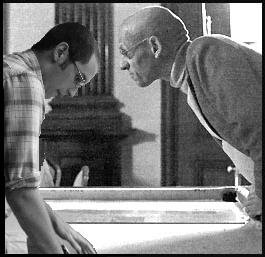
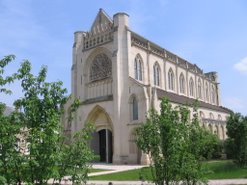
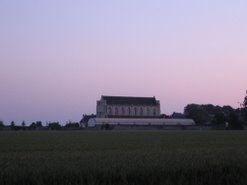

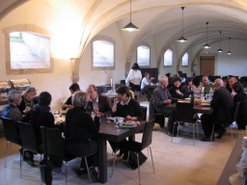
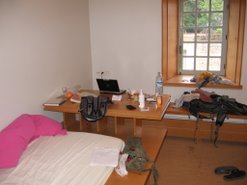
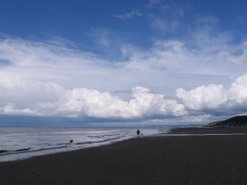
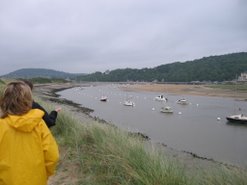
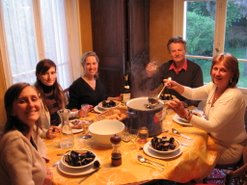
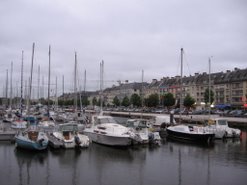
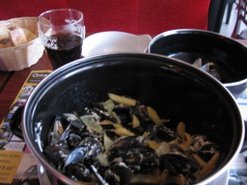

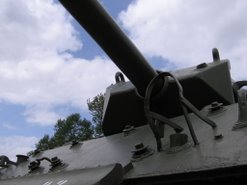
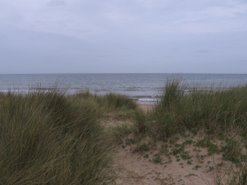
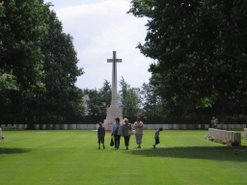
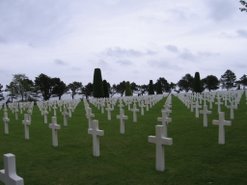
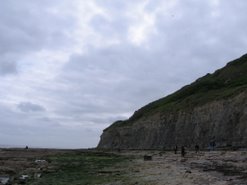
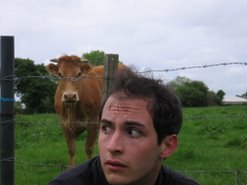

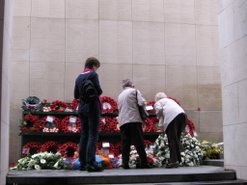

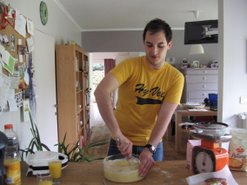
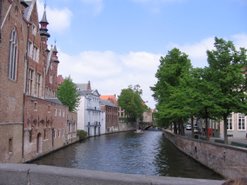
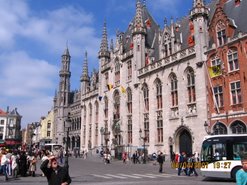

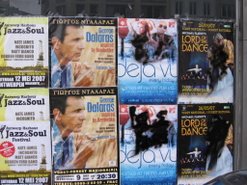



No comments:
Post a Comment